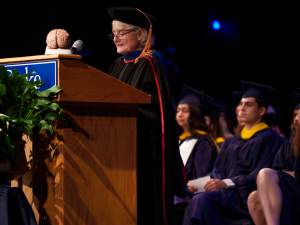Kevin LaBar Named Associate Director at Center for Cognitive Neuroscience

R. Alison Adcock, MD, PhD, recently named Director of the Center for Cognitive Neuroscience (CCN), has announced that Kevin S. LaBar, Professor of Psychology & Neuroscience in the Trinity College of Arts & Sciences, will serve as Associate Director for CCN. Dr. LaBar’s appointment was made in consultation with CCN faculty and other members of the Duke Institute for Brain Sciences (DIBS) community.
“Dr. LaBar was an early member of the CCN and helped establish its international reputation,” Adcock said. “We are fortunate that Kevin will now to bring to bear his experience, acquired in multiple prior leadership roles at Duke, including Division Director in Psychology & Neuroscience, and DIBS Co-Director of Undergraduate Studies in Neuroscience, on behalf of CCN as we continue to grow our programs.”
The CCN, a part of DIBS, focuses on research and education in the psychological, computational, and biological mechanisms of higher mental function. CCN faculty examine the variability in these mechanisms among individuals, across the lifespan, and between species. They also explore application of these mechanisms to real-world problems and their dissolution in disease and mental disorders.
Dr. LaBar’s research focuses on understanding how emotional events modulate cognitive processes in the human brain. He and his lab aim to identify brain regions that encode the emotional properties of sensory stimuli, and to show how these regions interact with neural systems supporting social cognition, executive control, and learning and memory. With Len White, PhD, he co-directs the Undergraduate Studies in Neuroscience program. He also is a Professor in Psychiatry and Behavioral Sciences in the Duke School of Medicine, a member of the DIBS Faculty Network, and an affiliate of the Duke-UNC Center for Brain Imaging and Analysis. He holds a PhD in Neural Science from New York University.
About the Duke Institute for Brain Sciences
DIBS is an interdisciplinary institute that promotes collaborative brain science and translates discoveries into solutions for health and society. The Institute is organized around four strategic priorities: (1) Catalyzing collaborative research; (2) Providing exceptional interdisciplinary education; (3) Building brain-science bridges among Duke departments and disciplines; and (4) Engaging and inspiring campus and community stakeholders. More information: https://dibs.duke.edu.




